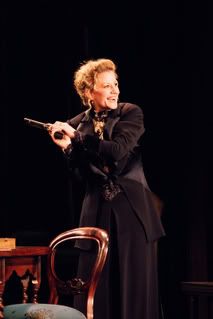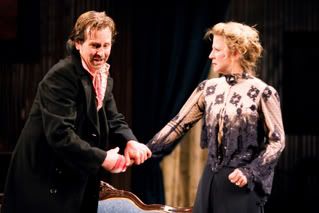Review: “Hedda Gabler”
(opened Feb. 14, 2007)ACT's hip, sassy `Hedda' starts strong, fades quicklytwo stars Too cute 'n' casual Theater, or so they say, is all about the communal experience. We breathe the same air as the actors and we commune with our fellow audience members.On the way out of the theater after American Conservatory Theater's Hedda Gabler on Wednesday night, a couple behind me compared notes on the production. ``Tedious, tedious,'' the woman said. ``Well, it was better than A Doll's House but they were both terrible,'' the man said. ``We should have watched `Infamous,' '' the woman added.I didn't feel quite as strongly as my fellow audience members about this Hedda, but I was disappointed, especially because the show starts out so strongly.Director Richard E.T. White reveals his stage in stages. First, we see a giant mural of a glacier on the back of the theater wall surrounded by scaffolding and a catwalk (set by Kent Dorsey). Then the walls of the Tesman home fly in, but, curiously, the walls of the house are made of rope -- many thick strands of rope, which makes them rustic and see-through.John Gromada's original music -- piano and a string or two -- lends an unsettling air, and we jump right into Henrik Ibsen's story of a most unpleasant woman making life a nightmare for just about everyone around her.Hedda (played by ACT company member Rene Augesen) admits that one of her goals in life is to have power over someone's destiny. Too bad that someone can't be herself. This is a woman out of control.Her new husband, Jorgen Tesman (Anthony Fusco) bores her silly, and his touch repulses her. She treats him with cold disdain, and he doesn't even seem to notice.He's a scholar, and she's the spoiled daughter of a celebrated general. She's the upper crust, he the dusty crust. It's a match made in heaven -- if your idea of heaven is a play where everything that could go wrong does.
Theater, or so they say, is all about the communal experience. We breathe the same air as the actors and we commune with our fellow audience members.On the way out of the theater after American Conservatory Theater's Hedda Gabler on Wednesday night, a couple behind me compared notes on the production. ``Tedious, tedious,'' the woman said. ``Well, it was better than A Doll's House but they were both terrible,'' the man said. ``We should have watched `Infamous,' '' the woman added.I didn't feel quite as strongly as my fellow audience members about this Hedda, but I was disappointed, especially because the show starts out so strongly.Director Richard E.T. White reveals his stage in stages. First, we see a giant mural of a glacier on the back of the theater wall surrounded by scaffolding and a catwalk (set by Kent Dorsey). Then the walls of the Tesman home fly in, but, curiously, the walls of the house are made of rope -- many thick strands of rope, which makes them rustic and see-through.John Gromada's original music -- piano and a string or two -- lends an unsettling air, and we jump right into Henrik Ibsen's story of a most unpleasant woman making life a nightmare for just about everyone around her.Hedda (played by ACT company member Rene Augesen) admits that one of her goals in life is to have power over someone's destiny. Too bad that someone can't be herself. This is a woman out of control.Her new husband, Jorgen Tesman (Anthony Fusco) bores her silly, and his touch repulses her. She treats him with cold disdain, and he doesn't even seem to notice.He's a scholar, and she's the spoiled daughter of a celebrated general. She's the upper crust, he the dusty crust. It's a match made in heaven -- if your idea of heaven is a play where everything that could go wrong does. It doesn't take long for intrigue to light a sinister spark in Hedda's eye. Her old flame, Ejlert Lovborg (Stephen Barker Turner, left with Augesen), is back in town, and he is what Donna Summer used to call a ``bad, bad, bad boy.'' Apparently his new lady friend, Mrs. Elvsted (Finnerty Steeves), has helped him put his drinking and carousing days behind him.Not for long. At least, not if Hedda has anything to say about it. This woman has pistols, and she's not afraid to use them (or to get other people to use them on themselves).If you're going to see a play on Valentine's Day, that play should be Hedda Gabler, the meanest and bloodiest romance around.For a while, White's production bubbles along in Paul Walsh's recently revised translation. The language is hip, casual and extremely accessible. Maybe too accessible if such a thing is possible. This is, after all, a period drama from the late 19th century. Some formality might help define the rules by which these characters play.But this Hedda comes across as quite the modern gal. She's not about to be imprisoned by a loveless marriage, and if she can't have her bad boy, then nobody can. At first Augesen's Hedda is cold, contemptuous and sort of fun. But as her tension increases and her manipulations begin to tangle in themselves, Augesen retreats.By Act 2 she has turned into Jennifer Aniston, all tics, mannerisms and cuteness. There's no emotional pay-off to this Hedda. It's not depressing, nor is it even upsetting. It's nearly 2 1/2 hours of intermittently interesting drama.Fusco's Tesman is believably naive, and Sharon Lockwood as a fawning auntie dominates the stage whenever she's on it.Jack Willis as a booze-guzzling, lady-loving commissioner hits some resonant notes of corruption, but Turner seems miscast as the stormy Lovborg. He seems more bureaucrat than rake.Who, ultimately, is the bad guy in Hedda Gabler? Is it a repressive society or is it a bored, petty woman with an inability to think of anyone other than herself? Based on this strangely bloodless production, I'd definitely go with the latter.For information about ACT and ``Hedda Gabler,'' visit www.act-sf.org.
It doesn't take long for intrigue to light a sinister spark in Hedda's eye. Her old flame, Ejlert Lovborg (Stephen Barker Turner, left with Augesen), is back in town, and he is what Donna Summer used to call a ``bad, bad, bad boy.'' Apparently his new lady friend, Mrs. Elvsted (Finnerty Steeves), has helped him put his drinking and carousing days behind him.Not for long. At least, not if Hedda has anything to say about it. This woman has pistols, and she's not afraid to use them (or to get other people to use them on themselves).If you're going to see a play on Valentine's Day, that play should be Hedda Gabler, the meanest and bloodiest romance around.For a while, White's production bubbles along in Paul Walsh's recently revised translation. The language is hip, casual and extremely accessible. Maybe too accessible if such a thing is possible. This is, after all, a period drama from the late 19th century. Some formality might help define the rules by which these characters play.But this Hedda comes across as quite the modern gal. She's not about to be imprisoned by a loveless marriage, and if she can't have her bad boy, then nobody can. At first Augesen's Hedda is cold, contemptuous and sort of fun. But as her tension increases and her manipulations begin to tangle in themselves, Augesen retreats.By Act 2 she has turned into Jennifer Aniston, all tics, mannerisms and cuteness. There's no emotional pay-off to this Hedda. It's not depressing, nor is it even upsetting. It's nearly 2 1/2 hours of intermittently interesting drama.Fusco's Tesman is believably naive, and Sharon Lockwood as a fawning auntie dominates the stage whenever she's on it.Jack Willis as a booze-guzzling, lady-loving commissioner hits some resonant notes of corruption, but Turner seems miscast as the stormy Lovborg. He seems more bureaucrat than rake.Who, ultimately, is the bad guy in Hedda Gabler? Is it a repressive society or is it a bored, petty woman with an inability to think of anyone other than herself? Based on this strangely bloodless production, I'd definitely go with the latter.For information about ACT and ``Hedda Gabler,'' visit www.act-sf.org.